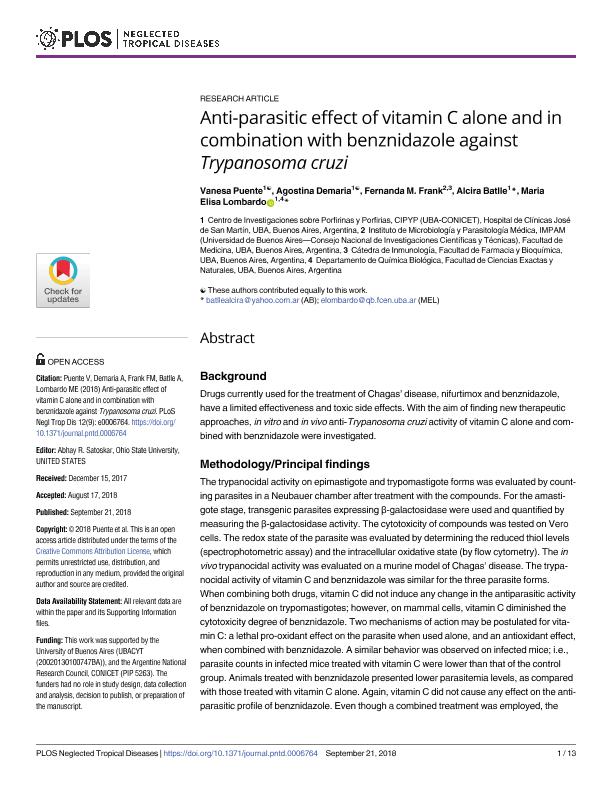Artículo
Anti-parasitic effect of vitamin C alone and in combination with benznidazole against Trypanosoma cruzi
Puente, Vanesa Rocío ; Demaria, Agostina; Frank, Fernanda María
; Demaria, Agostina; Frank, Fernanda María ; Batlle, Alcira María del C.
; Batlle, Alcira María del C. ; Lombardo, Maria Elisa
; Lombardo, Maria Elisa
 ; Demaria, Agostina; Frank, Fernanda María
; Demaria, Agostina; Frank, Fernanda María ; Batlle, Alcira María del C.
; Batlle, Alcira María del C. ; Lombardo, Maria Elisa
; Lombardo, Maria Elisa
Fecha de publicación:
09/2018
Editorial:
Public Library of Science
Revista:
PLoS Neglected Tropical Diseases
ISSN:
1935-2735
e-ISSN:
1935-2735
Idioma:
Inglés
Tipo de recurso:
Artículo publicado
Clasificación temática:
Resumen
Background: Drugs currently used for the treatment of Chagas’ disease, nifurtimox and benznidazole, have a limited effectiveness and toxic side effects. With the aim of finding new therapeutic approaches, in vitro and in vivo anti-Trypanosoma cruzi activity of vitamin C alone and combined with benznidazole were investigated. Methodology/Principal findings: The trypanocidal activity on epimastigote and trypomastigote forms was evaluated by counting parasites in a Neubauer chamber after treatment with the compounds. For the amastigote stage, transgenic parasites expressing β-galactosidase were used and quantified by measuring the β-galactosidase activity. The cytotoxicity of compounds was tested on Vero cells. The redox state of the parasite was evaluated by determining the reduced thiol levels (spectrophotometric assay) and the intracellular oxidative state (by flow cytometry). The in vivo trypanocidal activity was evaluated on a murine model of Chagas’ disease. The trypanocidal activity of vitamin C and benznidazole was similar for the three parasite forms. When combining both drugs, vitamin C did not induce any change in the antiparasitic activity of benznidazole on trypomastigotes; however, on mammal cells, vitamin C diminished the cytotoxicity degree of benznidazole. Two mechanisms of action may be postulated for vitamin C: a lethal pro-oxidant effect on the parasite when used alone, and an antioxidant effect, when combined with benznidazole. A similar behavior was observed on infected mice; i.e., parasite counts in infected mice treated with vitamin C were lower than that of the control group. Animals treated with benznidazole presented lower parasitemia levels, as compared with those treated with vitamin C alone. Again, vitamin C did not cause any effect on the antiparasitic profile of benznidazole. Even though a combined treatment was employed, the antioxidant effect of vitamin C on the host was evidenced; a 100% survival was observed and the weight loss occurring during the acute phase of the infection was reduced. Conclusions/Significance: Based on these results, the combination of vitamin C with benznidazole could be considered as an alternative treatment for Chagas’ disease. These preliminary results encourage further research to improve the treatment of Chagas’ disease.
Palabras clave:
Trypanosoma cruzi
,
Vitamin C
,
Treatment
Archivos asociados
Licencia
Identificadores
Colecciones
Articulos(CIPYP)
Articulos de CENTRO DE INVEST. SOBRE PORFIRINAS Y PORFIRIAS
Articulos de CENTRO DE INVEST. SOBRE PORFIRINAS Y PORFIRIAS
Articulos(IMPAM)
Articulos de INSTITUTO DE INVESTIGACIONES EN MICROBIOLOGIA Y PARASITOLOGIA MEDICA
Articulos de INSTITUTO DE INVESTIGACIONES EN MICROBIOLOGIA Y PARASITOLOGIA MEDICA
Citación
Puente, Vanesa Rocío; Demaria, Agostina; Frank, Fernanda María; Batlle, Alcira María del C.; Lombardo, Maria Elisa; Anti-parasitic effect of vitamin C alone and in combination with benznidazole against Trypanosoma cruzi; Public Library of Science; PLoS Neglected Tropical Diseases; 12; 9; 9-2018; 1-13
Compartir
Altmétricas



